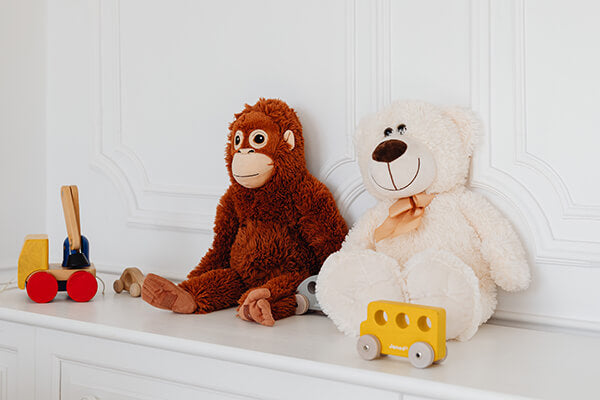Custom Plush Toys 101
| Mar, 01 , 22
The US toys & game market is a multi-billion dollar industry with various products, including board games, dolls, educational toys, and plush toys. People know plush toys with multiple names, such as stuffed toys, stuffed animals, soft toys, cuddly toys, or plushies. These toys come in many shapes and sizes, often resembling bears, elephants, or other animals. Other forms include entertainment characters, cartoon characters, mascots which are a part of the licensed merch industry. Sales of plush toys have been on the rise in the past few years, about $1.25 billion in 2020. So, this is a pretty lucrative market, and many big companies are offering a wide range of products such as plastic toys and plush toys. You will have stiff competition if you want to make some money by selling plush toys. But, there is one solution - custom plush toys; you can start small and then grow. This article will show you how to create your custom plush toy business.
Reasons to start a custom plush toy business
You can find plush toys in most children's bedrooms worldwide. There is a massive demand for these traditional toys even today, where people are leaning towards smartphones and iPads. The sale of plush toys was on an all-time high with the onset of the pandemic. There are several reasons to start your custom plush toys business:
- Universal appeal: Plush toys are cute and cuddly, it makes us happy, and everyone loves them. They make a perfect gift for every occasion, whether it's a birthday, Christmas, or office event. Children love these and take them even on vacations.
- High retention rate: People don't throw custom plush toys like other gifts in trash cans. They give it to their nieces, nephews, or less-privileged children when they don't want to keep it for themselves when someone gave them.
- Customizable: Custom plush toys give you the ability to customize in any shape, size, or color. They are ideal for organization branding and corporate gifting - you can draw in the form of their beloved character. With accessories like t-shirts or beanies, you can dress them up to make them even more appealing.
- Mascots: Most sports teams, schools, universities, and organizations have a mascot. You can create custom plushies for them.
- Promotional products: Custom plush toys are fantastic items for promotional purposes; people mostly get custom logo t-shirts, hoodies, and on some occasions custom socks, but rarely toys. They are pretty helpful in grabbing people's attention.
- Fundraiser items: Plush toys are not only about fun; they are also helpful in raising funds for critical issues. Handing out these as an appreciation gesture makes donors feel special. Selling these is another way to raise money for causes.
Now that you know the benefits of entering the custom toy business, you must know the complete process. Let us remind you, plush toy making is a complex process, and you would need a network of highly-trained professionals. You also need some working knowledge to get started.
Idea
Toy business is highly-competitive; you need to test your idea. In the annual New York toy fair, over 7,000 ideas come every year. To get into the plush toys business, you would require extensive research to turn your idea into a successful product. Start with conducting research both formally and informally. You will get an idea by reading industry trade magazines, online journals, and news. Nobody knows the future trends, but you can make an educated guess with the data. Visit various stores, including local, large chain, and online stores; most new launches occur during holidays. Take a note of packaging, the quality, price range, and marketing techniques.
Sellability
After developing your product idea, check its sellability. When purchasing a toy, people look for specific things; you need to meet them to make sales. Asking yourself these questions will help you weigh your idea:
- Will children/ people enjoy the toy: People buy products emotionally and then rationalize backward to justify their purchases. If the toy is appealing to their senses, they will buy it.
- Value for money: There is a price point after which any product does not provide any value to people's lives. It would help if you were careful while pricing your toys.
- Durability: Children will test the durability of their toys while playing; if the toy tears easily, then no parent will repurchase your toys.
- Growth potential: One of the crucial aspects of any business is growth potential; if your business model is not growth-friendly, it won't survive long.
Cost
Safety standards
Legal protection
Identify your target audience
Be it selling custom plush toys or any other business, everything starts with understanding your target audience. Determine the age group for which you are going to market your toys. For example, if you sell superhero custom plush toys, your target audience will be mostly boys. Keeping the audience in mind will help you with the aesthetic of toys.
Design and sample
After determining your target market, you can create the design with a brainstorming session. It is where your creativity, research, and data will be helpful. Start preparing sketches of the toy; you can do it yourself or hire professional designers. There are several online websites where you can find help quickly. You can also crowdsource the idea or start a competition on social media sites, but do let the designers know you would be keeping the copyrights of the designs. Experiment with various colors, sizes, and other possibilities; let your creative juices flow until you find the perfect sketch.
Find a manufacturer
Now, you can contact a manufacturer or create a 3D model of toys with computer software. It will give you an idea of what your toy will look like in reality.
You need to find a manufacturer for producing your custom toy designs. With several manufacturers in the industry, it can be confusing; keep these points in your mind while researching:
- Experience: Find out how much experience they have in producing custom toys. It would help if you also considered whether they have the experience of creating custom toys with the same materials you want.
- Delivery: Ask them their delivery time; some manufacturers take a lot of time, especially with rare materials and during holidays. You need to factor in all the possibilities and contact them at least two months in advance.
- Shipping: Consider the factory and the delivery location, custom duties, shipping costs, etc. Some custom plush toy manufacturers provide free shipping worldwide.
- Records: You want a reliable manufacturer. How will you find it? By looking at the testimonials on their website, social media sites, and, most importantly, third-party apps like Trustpilot.
- Extra help: Ask whether they provide some additional resources like help with the designs, order tracking tools, after-sales services, guidelines for marketing, etc. You want as much help as possible to become successful.
Make a physical sample
Sometimes what we envision might look completely different in real life. A physical sample will help determine the viability of your design and make changes to make it look better. It will also help you with appropriate fabrics and stuffing. Some manufacturers like EverLighten help you with creating free physical samples. Additionally, they also provide help with designs with their in-house designers.
Custom plush toy manufacturing is both lucrative and daunting, but it is slightly more manageable with the right partner by your side. EverLighten has over eighteen years of custom plush toys manufacturing experience and has helped many businesses, teams, colleges, universities, and social media influencers manufacture plush toys.
Factory pricing: They have their dedicated factory for custom plush toys; removing the middleman makes it possible for customers to get toys at the factory price.
Fast turnaround with on-time delivery: They complete every order quickly; customers always get their delivery on time.
No minimum order limit: The company accepts every order without restrictions on the minimum order quantity.
Free design help: Customers can upload their design ideas in sketches or images; experts help finish the design for free.
Quality check: The manufacturing experts check every plushie for its quality, ensuring only the items passing stringent quality standards reach customers.
Guaranteed money back: Customers can return the product with guaranteed money back if they are unsatisfied with the quality.
Free shipping: The company delivers to every part of the world for free.
Dedicated account manager: A dedicated account manager is provided to each customer to help resolve queries and communicate between different teams.
Real-time supply chain visibility: Customers can track their orders in real-time with an online order tracking tool.
We hope this blog provided you with all the knowledge to start with your custom plush toy business. So, if you have an idea in mind and need guidance and help, visit EverLighten.com to turn your vision into reality.
FAQs:
What makes a good plush toy?
A good plush toy should be:
- Soft and cuddly: Plush toys are meant to be hugged and loved, so they should be made from soft, comfortable materials like fleece, minky, or chenille.
- Durable: Plush toys should withstand being played with by children, so they should be made from durable materials that can be washed and dried without falling apart.
- Age-appropriate: Plush toys should be for the child's age who will be playing with them. For example, toys for young children should have no small parts that could be a choking hazard.
- Safe: Plush toys should be safe and should not have sharp edges or loose parts.
- Appealing: Plush toys should be appealing to children, both in terms of their appearance and personality.
Why are custom plushies so expensive?
Custom plushies are more expensive than mass-produced plushies for a few reasons. First, they are made in smaller quantities, which means that the cost of materials and labor is higher. Second, custom plushies are often more intricate and detailed than mass-produced plushies, which require more time and skill to make. Finally, custom plushies are often made from higher-quality materials than mass-produced plushies.
How much does it cost to make a plush?
The cost of making a plush toy can vary depending on several factors, including the size of the plush toy, the complexity of the design, the materials used, and the quantity being made. However, in general, you can expect to pay anywhere from $5 to $100 or more to have a custom plush toy made.

